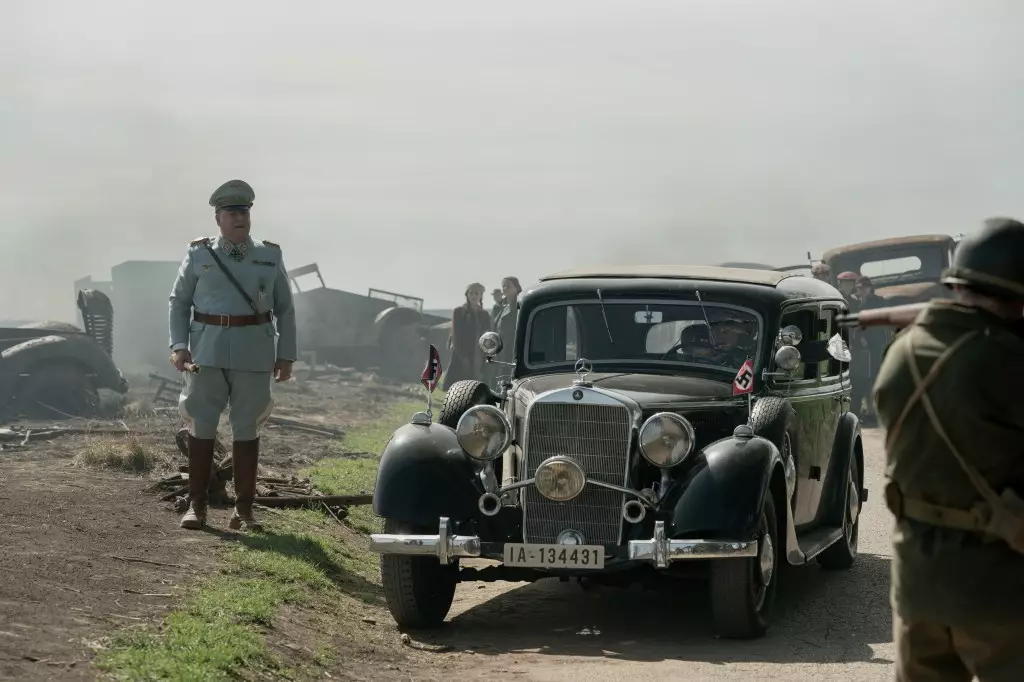In an age characterized by the fragility of democracy and rising authoritarianism, the upcoming release of James Vanderbilt’s film “Nuremberg” serves not merely as cinematic entertainment but as a clarion call to society. Set against the backdrop of one of history’s most notorious and consequential trials, the film delves deep into the psychological warfare faced by American psychiatrist Douglas Kelley, portrayed by Rami Malek, as he contends with Hermann Göring, played chillingly by Russell Crowe. This portrayal reminds audiences that the struggle between justice and vengeance is neither antiquated nor irrelevant; it resonates powerfully today.
The real-life Nuremberg Trials, meticulously chronicled in Jack El-Hai’s “The Nazi and the Psychiatrist,” exposed the abominations committed under the veil of dictatorship while seeking to hold the perpetrators accountable. In a time when moral certainty appears compromised, this narrative invites reflection on what it means to confront evil—be it historical or contemporary.
The Fragility of Justice
At its core, “Nuremberg” exposes the precarious line between retribution and justice. Vanderbilt poignantly highlights how the traumas inflicted upon countless lives pose profound questions about morality and accountability. Kelley’s purpose was not simply to determine whether Göring and other Nazi leaders were mentally fit to face trial but to grapple with the very essence of human nature amidst horror. This moral wrestling is not confined to the past; it echoes in modern debates surrounding war crimes, human rights violations, and the execution of justice.
As societal conflicts grow complex, and ideological divides widen, the film urges us to engage with uncomfortable truths about governance and power. The film’s narrative teaches that true justice requires diligence—understanding that merely punishing the guilty is insufficient; society must also seek truth and foster dialogue. It compels us to ponder: How can we aspire toward justice in our increasingly polarized contemporary landscape?
An Ensemble of Extraordinary Talent
Vanderbilt’s storytelling prowess is further complemented by a talented ensemble cast, including Oscar nominees Michael Shannon and an ever-impressive Malek. Their performances promise to bring a depth to characters that transcends mere artistic portrayal; they become conduits for larger societal issues. The film’s character studies serve to remind us that, in contexts of conflict, the human psyche can reflect both remarkable resilience and dismal depravity.
Critics have a unique opportunity here—to dissect not only the artistry within the film but the ethical concerns it raises. Crowe’s portrayal of Göring—a character rooted in a narrative of darkness—could encourage the audience to explore the psychology of evil. It pushes the viewer to confront existential questions regarding complicity and the very nature of power.
A Call to Recognize the Urgency of Moral Judgments
Vanderbilt has expressed that the timing of “Nuremberg” couldn’t be more critical. As we approach the 80th anniversary of the trials, it becomes imperative for viewers to consider the implications of justice—or the lack thereof—in modern society. The film boldly seeks to address the uncomfortable foothold of extremism, suggesting that as a society, we must stand vigilant against the corrupting influence of power, lest we allow history to repeat itself.
Just as the Nuremberg Trials sought to provide a foundation for global human rights legislation, the lessons gleaned from such historical moments are vital to our political discourse today. The film serves as a reminder that engagement in political and moral spheres must be met with a reflective conscience and commitment to humanity.
Though the film will soon hit theaters, it promises more than a simple recounting of historical events. It challenges us to view our current political realities through a lens of critical thought. A strong resonance exists between the past atrocities examined in “Nuremberg” and today’s crises surrounding justice and accountability. By invoking these timeless lessons, the narrative seeks to invigorate discussions that are not only necessary but perhaps essential for preserving the core tenets of freedom and democracy. In a world unsettled by hate, the power of Vanderbilt’s “Nuremberg” serves as a reminder that vigilance in the face of evil is a solemn yet vital duty of every generation.

